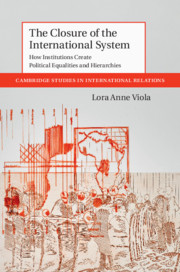 The Closure of the International System
The Closure of the International System Book contents
- The Closure of the International System
- Cambridge Studies in International Relations: 153
- The Closure of the International System
- Copyright page
- Dedication
- Contents
- Acknowledgments
- 1 False Promises of Universalism
- 2 The Closure Thesis
- 3 “The Master Institution”
- 4 “Dwarves and Giants”
- 5 “In Larger Freedom”
- 6 What Remains of the Promise of Equality?
- References
- Index
- Cambridge Studies in International Relations
2 - The Closure Thesis
Social Closure, Club Dynamics, and Stratification in the International System
Published online by Cambridge University Press: 16 June 2020
- The Closure of the International System
- Cambridge Studies in International Relations: 153
- The Closure of the International System
- Copyright page
- Dedication
- Contents
- Acknowledgments
- 1 False Promises of Universalism
- 2 The Closure Thesis
- 3 “The Master Institution”
- 4 “Dwarves and Giants”
- 5 “In Larger Freedom”
- 6 What Remains of the Promise of Equality?
- References
- Index
- Cambridge Studies in International Relations
Summary
This chapter develops the closure thesis—a theoretical framework for understanding the inter-related dynamics of political equality and inequality in the international system based on joining the neo-Weberian concept of social closure and the economic idea of club goods. The closure thesis consists of a constitutive and a causal logic that together contribute an explanation for the reproduction and transformation of political inequalities, understood as the distribution of participatory and procedural rights. The closure thesis makes a constitutive and a causal argument: first, that institutions create rules of closure that over time have narrowed—rather than expanded—the type of political actors considered legitimate participants, thereby constituting members as categorical equals and non-members as categorical unequals; second, that as institutions respond to normative or functional pressures to be include more, and more diverse, states, incumbents face strong incentives to respond by protecting their privileges through institutional designs—such as assimilative multilateralism, hierarchical multilateralism, and exclusive multilateralism—that distribute procedural rights unequally. The closure thesis thus contests the view that the globalization of the international system has been a process of greater inclusiveness of formerly marginalized actors accompanied by a more egalitarian and even democratic multilateral institutional order.
Keywords
- Type
- Chapter
- Information
- The Closure of the International SystemHow Institutions Create Political Equalities and Hierarchies, pp. 42 - 87Publisher: Cambridge University PressPrint publication year: 2020
